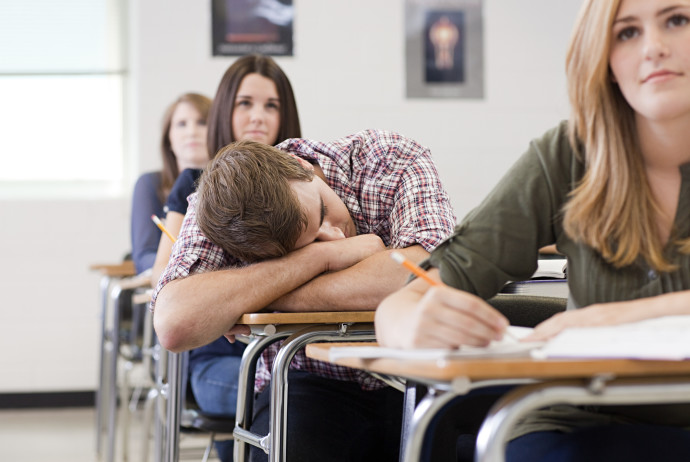By Samarth Desai ’16

An Opinator poll of the Wyoming Seminary community showed that, on average, students are getting less sleep than they should and are more stressed than not. The poll surveyed over two hundred students and asked questions about how much sleep they get and how much time they spend on schoolwork and extracurricular activities.
While the Center for Disease Control recommends that adolescents get 9 to 10 hours of sleep per night, the average Sem student gets only 6.5 hours, according to the poll. Additionally, the stress level of the average student is, on a scale of 1 to 10, a 6 on any given day. The average data for hours of sleep and stress levels, among other fields, were nearly consistent, with slight variations, across all grade levels and between boarders and day students.
In addition, the poll, which also surveyed thirty-nine faculty members, showed that the faculty have no illusions about their students’ sleep and stress. On average, faculty respondents correctly estimated that Sem students get between 6 and 7 hours of sleep per night, and that they were more stressed than not.
On average, sophomores reported getting the least sleep of any grade level, at 6.25 hours per night, followed by juniors and seniors at 6.5 hours. Freshmen get the most sleep, snoozing for about 7 hours nightly.
Juniors, however, spend the most time per night working. The poll showed that juniors spent 3.5 hours on schoolwork and 2.5 hours on extracurricular activities, likely a result of the increased burden of the junior year schedule: while most sophomores are taking no AP classes, most juniors are taking at least one.
Liz Abraham ‘15 is one of many juniors who has felt the pressures of an increased junior year workload. After jumping from zero APs as a sophomore to two as a junior, her sleep has gone down, and her stress has gone up. “It’s a lot more to balance, and time management has become much more important,” she said.
Although the amount of time that seniors spend on schoolwork and extracurricular activities is similar to that of other grade levels, and despite taking as many, if not more, APs than juniors, the stress level of the average senior was a 5, lower than that of the average student in any other grade level.
For many, the time that they spend on extracurricular activities prohibits them from going to sleep at a reasonable hour. “I spend three hours or so of my night swimming, with another hour of driving home, showering, and eating, before I can start my homework,” Tara Kupsky ‘18 said. “That impacts what time I can go to sleep that night and how stressed out I am that day.”
In addition to the slight variations among grade levels, the poll also showed that boarders get 20 minutes less sleep per night than day students. “Living in the dorms for six years has made me more sensitive to this issue,” James Doherty, the Chair of the Mathematics Department and a Carpenter Hall Dorm Parent, said. “When you’re living with seventy possible friends, it’s awfully hard to decide that it’s smarter to go to sleep early. There’s a pretty natural temptation at 10:30 at night to socialize and enjoy the company of the people that you live with.”
Sleep deprivation comes with many negative health effects. Getting less than the recommended 9 to 10 hours a night can lead to exhaustion, which in turn is associated with a host of other mental and physical problems, such as depression and headaches, according to research done by Challenge Success, a Stanford University-based institution.
For many students, however, getting 9 hours of sleep per night while still meeting the demands of a rigorous college preparatory school education is simply unrealistic. “I think the amount of academic work required on the college prep level coupled with the number of sports and EXCOLOs offered makes it difficult for students to complete homework before 11 P.M.,” Beth Blaum, the School Nurse, said. “This is the nature of competitive academic environments, and most students and their parents are aware when they enroll.”
Some faculty members, such as Mr. Doherty, are aware of the realities of a college preparatory education, but remain critical of it. “The system is beating us down by demanding that everyone look like Superman,” Mr. Doherty said. “There’s not much time to decompress. We all need that.”
So how can we get more sleep? Mrs. Blaum calls for Sem to help students make better choices by encouraging them to cut down on their involvement in numerous clubs. “We should support and encourage students to explore all [clubs], but we should guide them to make a decision to focus their time and talents on two or three per term.”
More important than getting more sleep, Mrs. Blaum said, is getting better, more consistent sleep. Although nearly a third of student respondents reported pulling an all-nighter at least once on a Sem school night, Mrs. Blaum condemns the practice.
“To use a simple analogy, the brain operates like a computer. It’s necessary to shutdown and reboot occasionally in order to keep your brain operating with speed and clarity,” she said. “If we could educate students to shutdown by 11 P.M., but set the alarm and get up an hour or two earlier, the quality of work and the quantity they can accomplish in the morning when the brain is fresh is significantly greater and more precise than any work done after 11 P.M.”
Most of all, Mrs. Blaum cautions against what she calls the “triple whammy”—no sleep, food, or hydration. “Even if a student is well-prepared and has an adequate grasp of the material, their recall will be depressed by lack of sleep, low blood sugar, and lack of water,” she said.
